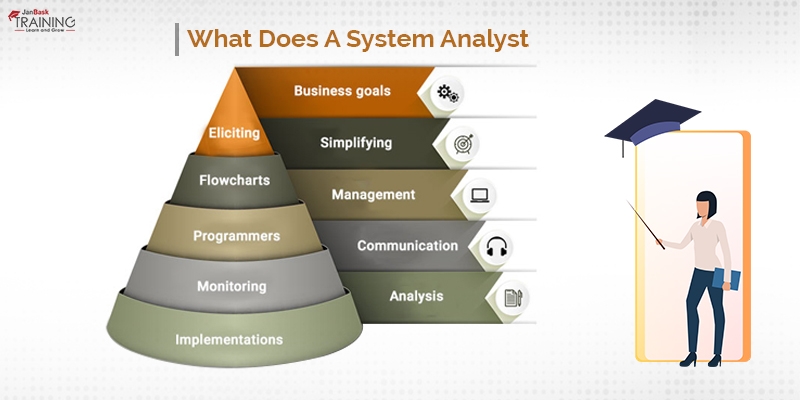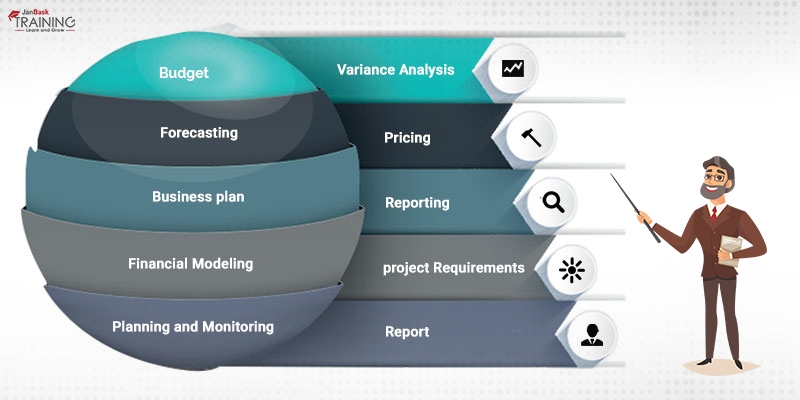09
JanYear End Sale : Get Upto 50% OFF on Live Classes + $999 Worth of Study Material FREE! - SCHEDULE CALL
Business analysts and System analysts may have similar titles but focus of their work differs greatly. This blog would help you in understanding the responsibilities of these professional. Once you go through the blog, you may understand well which role suits your professional abilities more. Let us first understand each of the roles in brief one by one.
A system analyst can look at the program or utility and see the code. He identifies where changes need to be made. He can incorporate new data into the existing program for benefiting the company. The system analyst collects data and transforms it into a meaningful state for the new project or program. He analyses where the problems exist in the code itself and then rewrites the code to solve the issue.
The role of a Business Analyst is a bit complicated one. He not only understands how IT speaks but how the stakeholders speak. He is more of a liaison between the IT team and management. He can look at all aspects of the Company and discover underlying causes for system failures.
A business analyst retrieves reports or data from IT and transforms it into meaningful information that is needed to develop a project plan or program. Further, a business analyst is also able to perform the necessary research to help the other departments as well. In brief, a business analyst is always more creative and flexible to manage multiple things together.
Learn Business Analyst in the Easiest Way

He is the person who pulls several teams together to focus on the outcome of a project. He is good at heading up meetings to present information in an easy understand format. He is the driving force behind the project plan. Both are really essential for a Company. The system analyst may need a business analyst to check what is needed for the code to work effectively and at the same time, the business analyst needs system analyst to make the code work effectively. While working together, these two roles bring wonderful revolution to the Company. Let us understand the differences in little more detail in the below sections.

He utilizes IT systems to achieve strategic business goals. He may design or develop new systems by configuring new hardware or software programs or use existing systems in different ways to accomplish goals and desired outputs. A set of typical tasks performed by the system analyst include:
Read: What Are The Fundamental Categories Of A Business Intelligence (BI) Analysis?
The person should have at least a bachelor’s degree when applying for the system analyst post. It is great if you are a graduate in computer science, IT (Information technology), or other similar fields. A few employers prefer background combined with computer skills. Others seek industry-related experiences like finance, telecommunications, healthcare, or any other technical skill.

In brief, the system analyst role requires more technical knowledge, while a business analyst needs to understand the complexities of business using the latest technology to solve them. You can learn the basic aspects of System analyst if you have useful learning material and have time to practice and work on the skills.
Business Analyst Training & Certification

A business analyst possesses technical knowledge too but not in depth. He is more focused on identifying opportunities to improve the overall business processes and eliminate issues that affect productivity, distribution, and output. So, knowing how to utilize technology to solve business problems is vital for the success of an organization.

These professionals require a high degree of specialized skills to improve business problems through a variety of job duties. Some of the major responsibilities of a business analyst are given below.
To become a successful business analyst, technical skills and business acumen should be combined with a degree of confidence that is acquired with the right skills set and education. Many professionals try to get special degrees in finance, business administration, HRM, etc to handle projects more effectively. Along with training, certifications are usually given more importance and certified people are hired quickly and getting more value as compared to other candidates. 
Read: 15 Business Analyst Project Ideas For a Compelling Resume
Although, we have witnessed a lot of differences when we carried out business analyst vs system analyst comparison, there are still some similarities in the skills required for both the profiles, which are-
These skills are common for both the profiles. A business analyst should have a broad base of business knowledge and sharply honed essential skills while system analyst skills are more technology specific.
Business Analyst Training & Certification

According to BLS (The US Bureau of Labor Statistics), the job market will expand for both profiles either a business analyst or system analyst. Both are good career options with attractive salary options in the next many years to come. The average salary of a system analyst is noted as $87,220 while the average salary of a business analyst is calculated as $81,333 approx.
When jobs are posted on portals for system analysts or business analysts, you should focus on responsibilities area more because sometimes business analyst roles may include a combination of both and vice versa. So, don’t forget to check the complete details on the job portal before you apply for the position.
Now, let us check out the hiring process for both the roles. When looking for a job in this domain, figure out where do you stand in the process and decide what steps will you take for getting hired?
First, figure out whether you qualify as a system analyst or business analyst. If your resume does not include the needed skills or education, then acquire the skills first before you start applying for jobs directly. If you have any specific experience, don’t forget to add it into your resume to grab the job quickly when compared to other candidates,
Design your resume in such a way that skills related to the profile should be noticeable at first glance. If your resume fails to highlight your skill sets and education background, then you will never get a call for the next round. If you don’t know how to make your resume attractive, then you may hire a resume writing expert to make things a little easier for you.
Read: What is Requirement Management? Top 13 Tools for Requirement Management
With a deep understanding of skills and education needed for the profiles, you need to start applying for jobs. If you are applying for hundreds of jobs together then chances are you will get multiple calls for interviews and chances of getting hired are pretty highe.
Now when you started receiving calls for interviews, this is the time to show confidence and represent yourself in the best way. You will be asked multiple questions, but you don’t have to be confused but prepare for interview questions in advance to increase your chance of getting hired at the final time.
Once you make it through the job interview and get the offer letter, you need to make an informed decision about the offer now. You should decide whether the offer works for you in terms of salary, work location, timing etc. Think appropriately about all these and make a thoughtful decision by analyzing all possible aspects before you join the Company.
Business Analyst Training & Certification

The difference between business analyst and system analyst is quite clear after this discussion. The business analyst professionals need skills specific to the business involving eliciting, analyzing, communicating, testing, or verifying requirements. He should have the ability to identify opportunities to solve business problems and improve processes. Whereas, system analysts are functional experts who work for change and improvement, helping organizations to reach their strategic goals through continual technology improvements.
It should be clear that the comparison was of business analyst vs system analyst and not business systems analyst vs business analyst. A business system analyst is similar to a computer system analyst who works on computer technologies specifically needed for the business.
In the end, we would recommend you to sign up for the individual courses at Janbask Training if you aspire to become either a business analyst or system analyst and if you want to gain extensive knowledge of any of the profiles.
Read: What is the Average Business Analyst Salary in Canada
 Pinterest
Pinterest
 Email
Email
The JanBask Training Team includes certified professionals and expert writers dedicated to helping learners navigate their career journeys in QA, Cybersecurity, Salesforce, and more. Each article is carefully researched and reviewed to ensure quality and relevance.

Cyber Security

QA

Salesforce

Business Analyst

MS SQL Server

Data Science

DevOps

Hadoop

Python

Artificial Intelligence

Machine Learning

Tableau
Search Posts
Related Posts
Receive Latest Materials and Offers on Business Analyst Course
Interviews